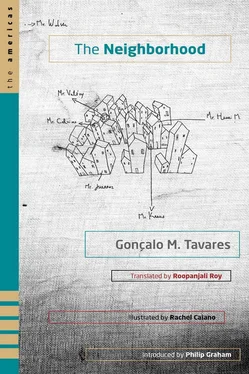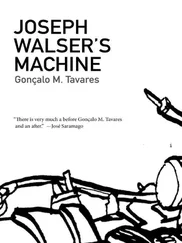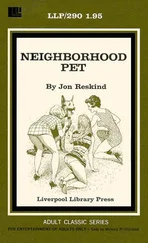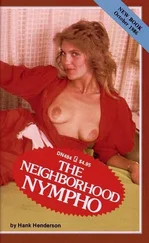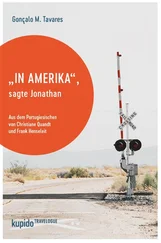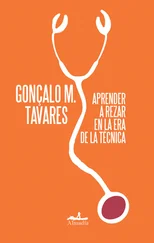“I don’t need to know geography!” the Boss had responded on that occasion, bothered. “What I need to do is prepare speeches. The most important thing is to know how to speak about the mountains. Who needs to know where the mountains are located?”
“But it’s good to be familiar with the territory of the nation,” insisted the giant. “So that not even a single square meter escapes from your orders.”
There you had it. That final sentence had touched a chord with the Boss’s most sensitive spot.
“Go on, go on.”
“The advantage of being familiar with the country, especially its geography, is that you can thus send orders to every little corner. If you know your geography, your orders can be exhaustive, down to the last square meter. It’s almost like having a sheet of paper with a grid of squares and filling up all the spaces with your directives. Without leaving even the tiniest elevation or a miserable stream outside the benevolent reach of your political measures.”
“I hadn’t thought of that.”
“But think, do think,” suggested the little Assistant. “Boss, do you think it’s right that some little village, hidden behind a mountain of hay, should be deprived of the privilege of receiving at least one or two political orders per day from Your Excellency?”
“You’re right,” murmured the Boss. “Give me that map.”
Opinion Polls

1
The elections were approaching and the opinion polls did not favor the Boss.
“The question is this,” said the Boss, “when an individual, even one in full command of his brain, says that he is leaning to the left and not to the right, who can say that he is not thinking precisely the opposite?”
“That’s a question one can always consider.”
“Moreover,” continued the Boss, “who is to say that when he says that he wants to go to the left he doesn’t really want to go to the right?”
“I had already thought of that,” murmured an Assistant.
“I had also thought of that,” added the other.
“We both thought at the same time,” the two agreed.
“Thus, my theory about opinion polls is, in the first place, the following, and let me explain …”
The two Assistants had already arranged their expressions in the form of an attentive ear.
The Boss continued, “It is not enough to obtain the opinion of the people. It is necessary to interpret it. Even when they only write a cross, what does that cross mean? Each personal opinion should be interpreted under a magnifying glass, by specialists.”
“Who are …?”
“Who are what I call: Specialists in Me.”
“Therefore, specialists,” murmured the Assistant, “in the study of the human mind, human personality …?”
“Who said anything about humans?!” retorted the Boss, later emphasizing the first word. “I said, specialists in Me. In Me, get it?!”
“Ah, experts specializing in Your Excellency, in the Boss.”
“Well, there you are! Finally! And who is the best specialist in Me, I ask? Who is best qualified to interpret the subjective opinion of the highly subjective individuals of this nation? Who is the best specialist in Me?”
“Your Excellency?” hazarded the Assistants.
“Exactly. Me! Me! I am the one who will objectively interpret the subjective opinion of the people.”
“Bravo! That’s science.”
2
“Very well,” accepted the Boss, finally. “If the opinion polls want to resort to the participation of the people, so be it.”
“They are talking about random samples.”
“Random? How imprudent!”
“Random, but not that random. Despite everything, there is an order to it. With a certain number of women, men, et cetera. It’s all very scientific.”
“Let them keep the scientific element of opinion polls, I always liked science. But the units of this science should be defined by me.”
“How, Your Excellency, Boss?”
“The proposal that seems to me to be the fairest and most balanced solution of all is as follows: the opinion poll should be extended to a sample that is as large as possible: men, women, youths, senior citizens. And others as well.”
“Even the others?”
“Even the others.”
“This is democracy!”
“Long live democracy!” yelled the other Assistant immediately.
“And they should all be given my phone number.”
“What?”
“My phone number,” said the Boss. “Each one of the elements of this representative sample, chosen randomly according to scientific criteria, should call me to find out my opinion. Thus we will have a fair opinion poll, with an extended sample, and an objective and pondered opinion.”
“Thus, Boss, you suggest that instead of giving their opinion, the opinion poll sample call you for you to give your opinion to everyone.”
“One at a time.”
“And they won’t be able to accuse us of tampering with the results?”
“Of course not. The question will always be asked by a different person. This is what we have to highlight. Any member of the population can ask my opinion. How can one manipulate the data if the people themselves are the ones asking me questions?”
“You’re right, Boss.”
“And it’s original.”
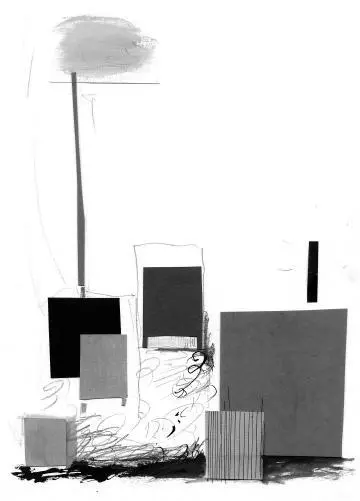
“What is important in a television debate?”
Mister Kraus responded, “Argumentative profoundness loses (by a K.O.) in the face of the quality of eyebrow movement. How many votes is a certain twitch of the nose at an incisive moment worth?! The answer would shake the foundations of our faith in democracy,” murmured Mister Kraus.
Dialogue (One Day before the Elections)

“This thing about a balanced view, holding ballots at all times and just about everywhere.”
“We are living in a century of democracy: the people should have a say in everything.”
“Even those whose voice …”
“Even those people.”
“Therefore: the people would decide everything.”
“I was talking, for example, about a game of football.”
“A game that is nothing more than a dictatorship by the players.”
“So what you are proposing is …”
“I’ll repeat that: the decision should be left to the spectators of a match and not the players.”
“Very well.”
“Instead of twenty-two players and a referee deciding the outcome of the game, the thirty thousand spectators would do so. By voting. It’s a vast difference. You only need to do the math.”
“Only the spectators present in the stadium would be able to vote?”
“Yes.”
“That’s fair.”
“And an excellent way of inducing people to go and watch the match. They would actually be responsible for deciding the outcome. It would be worth making the trip. I don’t think it’s fair to leave something so important — like the outcome of a match — only in the hands (or feet) of fewer than two dozen citizens.”
“In this case, called: football players.”
“Exactly.”
“The outcome of the matches would then be decided not by momentary skills but by pondered decisions by the population.”
“It seems fair to me. We are living in a century of intelligence and votes.”
“A football match decided by a popular vote (especially by the spectators) and not on account of goals by players! It’s changes like this that transform a backward country into a developed nation.”
Читать дальше
